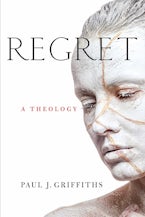"Avoiding the simple distinction between shame and guilt, Griffiths thinks theologically about regret in a manner that gestures toward Easter. He shows how regret can be the first tool in a technology of the heart, one that works repentance. In this way, he identifies how the feeling with which many now wrestle is, in fact, necessary for their being made whole by the gospel." —The Christian Century
"Paul Griffiths' Regret: A Theology probes what it means to be in situations that we wish were otherwise, and the attitudes—regret, as well as remorse, contrition, and penance—that surround them. A Catholic theologian's task, he tells us with a wink, is not to be right, but to be interesting." —The Way
"Paul Griffiths's Regret: A Theology offers a concise itinerary of what he calls 'the otherwise-attitudes, with penance as their culmination, lament as their entry point, remorse as their deformed sibling, contrition as their heart, and avowal as the beginning of the transfiguration of what's regretted.' . . . Griffiths is an astonishingly gifted thinker, writer, and teacher." —Church Life Journal
"In his new book, Griffiths performs . . . an analysis on a range of statements about regret, many of them drawn from literary works, in an effort to see what Christians can say about the topic. . . . Griffiths writes that theology first of all must respond to God. After that, 'it should seek to be interesting.' Regret certainly is." —Commonweal
"Paul Griffiths's Regret is very well written, and composed in a highly readable style. It is a brilliant piece of analytic phenomenology, taking the reader through all the stages of regret. The discussions about the permanent residue of the regrettable are brilliant, and Griffiths's fine analytic thinking cannot be too highly praised." —Francesca Aran Murphy, author of God Is Not a Story
"Griffiths's book is a theological reflection upon regret—a concentrated meditation upon the theological meaning of the desire that things might have been otherwise. It is both brilliant and wonderfully idiosyncratic, as is the case with all of Griffiths's writings." —David Bentley Hart, author of Theological Territories
"A lucidly-written, sharply thought-out, and consistently clear-eyed account of an existential issue that is common to all humanity, and which has particularly important contours within Christian faith: What, if anything, can be done about things that we have done, or somehow participated in, and which we have come to regret?" —International Journal of Systematic Theology

